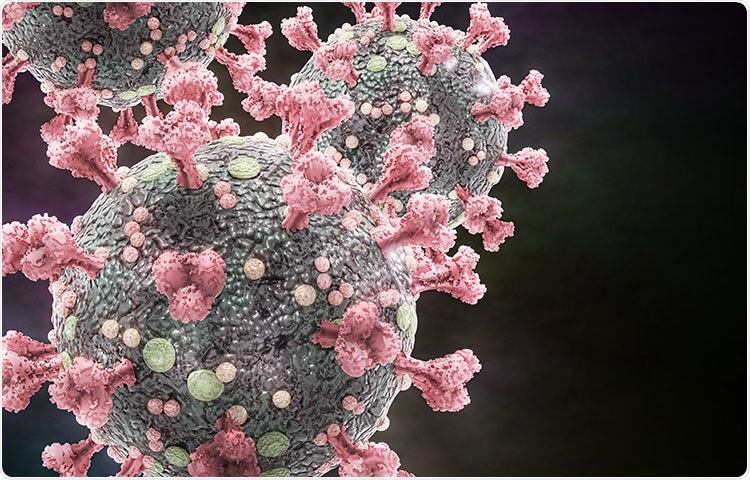At Sanford Burnham Prebys Medical Discovery Institute, researchers have found a set of human genes that combat infection due to SARS-CoV-2, the virus responsible for causing COVID-19.

Microscopic view of coronavirus. Image Credit: Dotted Yeti.
The knowledge of which genes help regulate viral infection can considerably help researchers gain insights into factors affecting disease severity and also propose potential therapeutic options. The concerned genes are associated with interferons—the frontline virus fighters of the human body.
The research was recently reported in the Molecular Cell journal.
We wanted to gain a better understanding of the cellular response to SARS-CoV-2, including what drives a strong or weak response to infection. We’ve gained new insights into how the virus exploits the human cells it invades, but we are still searching for its Achille’s heel so that we can develop optimal antivirals.”
Sumit K. Chanda, PhD, Professor and Director, Immunity and Pathogenesis Program, Sanford Burnham Prebys
Chanda is the lead author of the paper.
As soon as the pandemic started, clinicians discovered that a weak response of the interferons to SARS-CoV-2 infection led to some of the more acute COVID-19cases. This insight prompted Chanda and his colleagues to look for the human genes activated by interferons, called interferon-stimulated genes (ISGs), which serve by limiting SARS-CoV-2 infection.
Using the insights gained from SARS-CoV-1, the virus responsible for a deadly, yet comparatively brief, disease outbreak between 2002 and 2004, and having known that it was similar to SARS-CoV-2, the researchers could develop laboratory experiments to find the ISGs that regulate viral replication in COVID-19.
“We found that 65 ISGs controlled SARS-CoV-2 infection, including some that inhibited the virus’ ability to enter cells, some that suppressed manufacture of the RNA that is the virus’s lifeblood, and a cluster of genes that inhibited assembly of the virus,” added Chanda. “What was also of great interest was the fact that some of the ISGs exhibited control across unrelated viruses, such as seasonal flu, West Nile and HIV, which leads to AIDS.”
We identified eight ISGs that inhibited both SARS-CoV-1 and CoV-2 replication in the subcellular compartment responsible for protein packaging, suggesting this vulnerable site could be exploited to clear viral infection. This is important information, but we still need to learn more about the biology of the virus and investigate if genetic variability within these ISGs correlates with COVID-19 severity.”
Laura Martin-Sancho, PhD, Senior Postdoctoral Associate in Chanda Lab, Sanford Burnham Prebys
Martin-Sancho is the first author of the paper.
The further step for the team will be to study the biology of SARS-CoV-2 variants that have been continuously evolving and threatening the efficacy of vaccines. Martin-Sancho adds that collection of variants for laboratory investigation has already begun
It’s vitally important that we don’t take our foot off the pedal of basic research efforts now that vaccines are helping control the pandemic. We’ve come so far so fast because of investment in fundamental research at Sanford Burnham Prebys and elsewhere, and our continued efforts will be especially important when, not if, another viral outbreak occurs.”
Sumit K. Chanda, PhD, Professor and Director, Immunity and Pathogenesis Program, Sanford Burnham Prebys
Source:
Journal reference:
Martin-Sancho, L., et al. (2021) Functional Landscape of SARS-CoV-2 Cellular Restriction. Molecular Cell. doi.org/10.1016/j.molcel.2021.04.008.